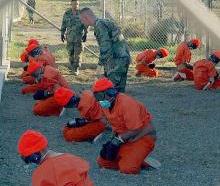 WASHINGTON (CNN) -- The U.S. Navy base at Guantanamo Bay, Cuba, will be getting an estimated $40 million communications upgrade, signaling it will continue its mission of holding top suspected terrorists and as a major humanitarian aid base in the region.
WASHINGTON (CNN) -- The U.S. Navy base at Guantanamo Bay, Cuba, will be getting an estimated $40 million communications upgrade, signaling it will continue its mission of holding top suspected terrorists and as a major humanitarian aid base in the region.
The base, also known as Gitmo, will upgrade its limited satellite communications system to an underwater fiber optic line that will stretch from the base to the coast of Florida, according to Pentagon spokesman Army Lt. Col. Todd Breasseale.
The United States has alerted the Cuban government that it intends on starting the project this summer with a survey ship operating off the eastern coast of the country evaluating the expected route, but actual work of installing the cable will being within a couple of years.
The outdated satellite communications system was overburdened with the military court hearing the cases of the top 9/11 plotters and other war-on-terrorism suspects, as well as the ongoing detention operations.
Upgrading to a fiber optic line allows much more bandwidth and a more secure line during bad weather that can hamper satellite communications, according to Breasseale.
While close to the United States, the base is still remote in southeastern Cuba, and is often in the path of severe weather. It generally houses about 6,000 troops and civilians.
"The project will bring the base online with communication technology equal to that of the Department of Defense footprint around the world," Breasseale said.
While the 45-square-mile base has become well known for holding terrorism suspects since early 2002, the base has been controlled by the United States for over 100 years, though its role has shrunk considerably over the decades.
But the United States also uses it as a major contingency base for humanitarian aid operations, most recently using it as a staging ground to bring relief into earthquake-stricken Haiti in 2010. In the 1990s the base was also used to house refugees from Haitian political unrest.
With large swaths of open land, the base is prepared to take on thousands who could be housed in tents, according to Breasseale.
"The need for humanitarian aid is not going away, and this base is needed for that," Breasseale said.
- Home
- News
- Opinion
- Entertainment
- Classified
- About Us
 MLK Breakfast
MLK Breakfast- Community
- Foundation
- Obituaries
- Donate
04-23-2024 3:38 am • PDX and SEA Weather




















































































































































































































































































































